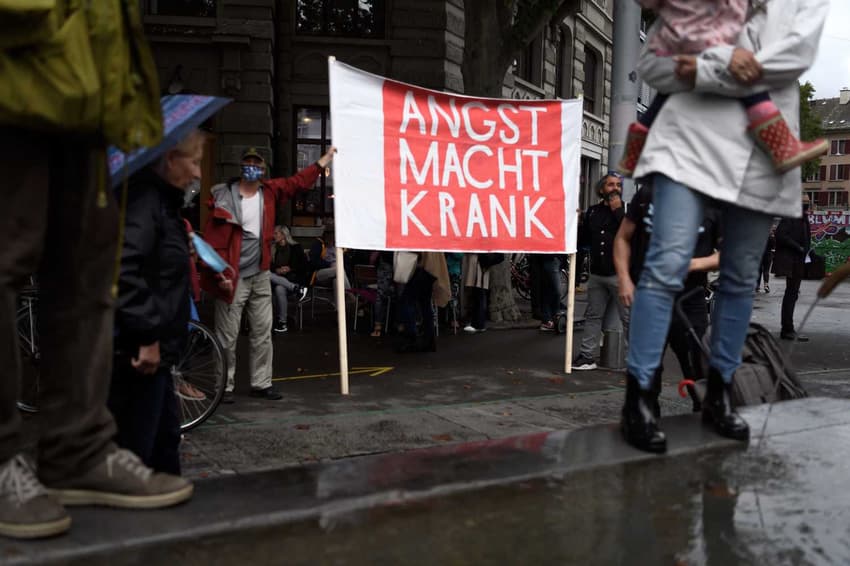Swiss police concerned about 'extremism' among corona sceptics

Coronavirus scepticism is a growing problem in Switzerland. Police and intelligence services are concerned that the movement could lead to radicalisation.
Coronavirus scepticism is on the rise in Switzerland, with ever more frequent rallies being held across the country.
Besides the problematic scientific and health implications of the movement, experts are concerned that it may lead to radicalisation.
Marko Kovic, social scientist and expert on conspiracy theories, told 20 Minutes that as the movement grows and frustrations increase, the chance of violence grows.
“For individuals, there may be no other way out of this conspiracy swamp than to defend themselves against it with violence,” Kovic said.
"The pressure increases - and at some point it pops."
IN PICTURES: Inside Switzerland's anti-coronavirus lockdown protests
‘A breeding ground’
Dirk Baier, professor for crime prevention and delinquency at Zurich University of Applied Sciences, said the coronavirus skeptic movement was a “breeding ground for radicalisation”.
Baier said however that “only a small percentage would be willing to use violence”.
The office for extremism and violence prevention in Winterthur, Zurich, received four times as many inquiries as usual in August.
IN PICTURES: Hundreds attend coronavirus skeptic rally in Zurich
Urs Allemann, director of the office, told Swiss news outlet 20 Minutes “some of the coronavirus-sceptical groups are likely to be susceptible to radicalisation.”
“A pattern cannot be identified, but inquiries about right-wing extremism have increased slightly. We also had isolated consultations on conspiracy theories.
“Conspiracy theories are a gateway for extremist interpretations. Some of the corona-skeptical groups are likely to be susceptible to radicalisation.”
Comments (2)
See Also
Coronavirus scepticism is on the rise in Switzerland, with ever more frequent rallies being held across the country.
Besides the problematic scientific and health implications of the movement, experts are concerned that it may lead to radicalisation.
Marko Kovic, social scientist and expert on conspiracy theories, told 20 Minutes that as the movement grows and frustrations increase, the chance of violence grows.
“For individuals, there may be no other way out of this conspiracy swamp than to defend themselves against it with violence,” Kovic said.
"The pressure increases - and at some point it pops."
IN PICTURES: Inside Switzerland's anti-coronavirus lockdown protests
‘A breeding ground’
Dirk Baier, professor for crime prevention and delinquency at Zurich University of Applied Sciences, said the coronavirus skeptic movement was a “breeding ground for radicalisation”.
Baier said however that “only a small percentage would be willing to use violence”.
The office for extremism and violence prevention in Winterthur, Zurich, received four times as many inquiries as usual in August.
IN PICTURES: Hundreds attend coronavirus skeptic rally in Zurich
Urs Allemann, director of the office, told Swiss news outlet 20 Minutes “some of the coronavirus-sceptical groups are likely to be susceptible to radicalisation.”
“A pattern cannot be identified, but inquiries about right-wing extremism have increased slightly. We also had isolated consultations on conspiracy theories.
“Conspiracy theories are a gateway for extremist interpretations. Some of the corona-skeptical groups are likely to be susceptible to radicalisation.”
Join the conversation in our comments section below. Share your own views and experience and if you have a question or suggestion for our journalists then email us at [email protected].
Please keep comments civil, constructive and on topic – and make sure to read our terms of use before getting involved.
Please log in here to leave a comment.